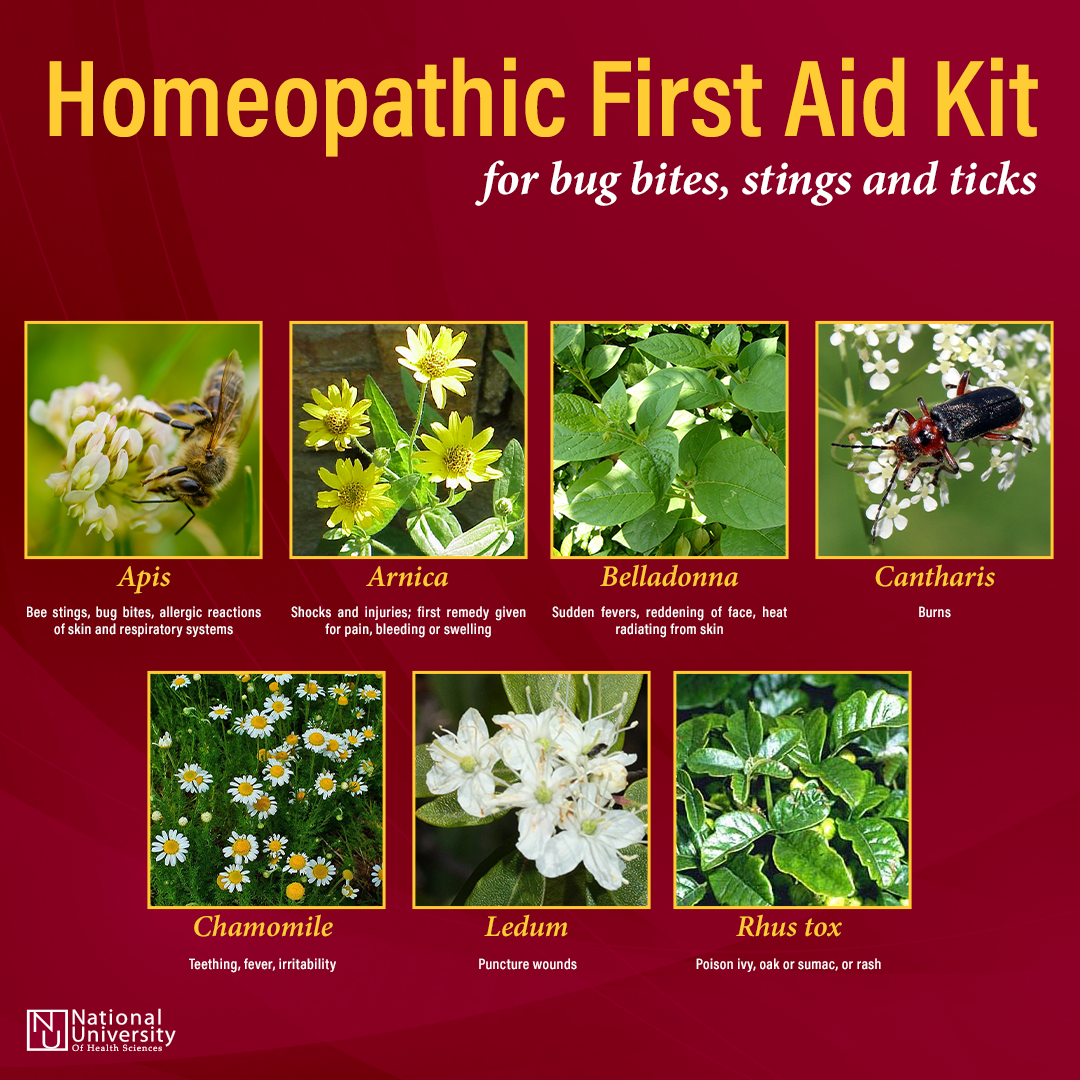No matter the season, bug bites and stings can cause distress, but the good news is that naturopathic and homeopathic treatments can bring safe relief. Jennifer Green, ND, DC, Chief Clinician of Naturopathic Medicine at National University of Health Sciences’ (NUHS) Whole Health Clinic in Lombard, Illinois offers preventative tips, natural remedies, and what to include in your naturopathic/homeopathic first aid kit.
Bug Bites and Stings
Prevention: Apply bug spray before playing outside; avoid mosquitoes by staying inside at dawn and dusk; avoid or remove still water from around your home (such as buckets, or planters); wash with citronella soap and take B Vitamins to help prevent attracting mosquitoes to your skin.
Natural/Naturopathic Remedies
- Aloe Vera – Contains more than 130 active compounds and 34 amino acids beneficial for skin.
- Apis mellifica – For swelling and itching.
- Basil – Contains camphor and thymol, two compounds that can relieve itching. Crush up some fresh herb and apply directly to the bite, or buy the essential oil.
- Vitamin C – To reduce allergic response.
- Calendula – Contains soothing, moisturizing and rejuvenating properties.
- Chamomile – Used in a tea or applied to the skin. Rich in the bioflavonoids apigenin, luteolin and quercetin.
- Cinnamon – In addition to repelling mosquitos, cinnamon has antibacterial and antifungal properties.
- Cucumbers – Helpful for reducing swelling.
- Honey (Raw, Organic!) – An especially powerful variety is Manuka honey from New Zealand; made from bees that feed on flowers of the Manuka bush, also known as the “Tea Tree.”
- Lavender – A popular essential oil for its calming scent; as antimicrobial as it is soothing.
- Lemon and Lime – Both have anti-itch antibacterial and antimicrobial actions. Avoid applying citrus juices to your skin when outdoors, as blistering can occur when exposed to sunlight.
- Neem Oil – Treats fungal conditions, boils, eczema and ringworm—also helpful for insect bites.
- Stinging Nettle Tea – A natural antihistamine.
- Tea Tree Oil – Helpful for healing cuts, burns, infections and many other skin afflictions. Also a good antimicrobial, antifungal agent.
- Peppermint – Its cooling sensation can block other sensations, such as itching, providing temporary relief. Its essential oil, or crushed, fresh leaves will do.
Ticks
Prevention: Wear a hat, long-sleeved and long pant clothing, as well as high socks; avoid wooded and brushy areas; walk in the center of trails; spray tick repellent on clothing and shoes before going outdoors and always wear shoes–no bare feet or sandals! Helpful hint: Wear light colored clothing, it makes ticks easier to see.
After you come back inside…
- Bathe or shower as soon as possible after coming indoors (preferably within two hours) to wash off and more easily find ticks.
- Conduct a full-body check. Check for ticks under the arms, in and around the ears, inside the belly button, behind the knees, between the legs, around the waist, and especially in the hair.
- Examine gear and pets. Ticks can hide in clothing and on pets, then attach to another person later. Carefully examine pets, coats and day packs.
- Tumble dry clothes in a dryer on high heat for 10 minutes to kill ticks on dry clothing. If the clothes are damp, additional time may be needed.
If the clothes require washing first, hot water is recommended. Cold and medium temperature water will not kill ticks effectively. If the clothes cannot be washed in hot water, tumble dry on low heat for 90 minutes or high heat for 60 minutes. The clothes should be warm and completely dry.

In addition to your standard first aid kit, consider adding these helpful remedies:
Your Naturopathic First Aid Kit:
- Manuka honey or bentonite clay – Insect bites or stings
- Arnica Cream – Bruising, swelling, sprains, strains
- Calendula (salve or spray)– Scrapes, burns, bites
- Manukaderm bandages
- Eye drops
Your Homeopathic First Aid Kid:
- Apis – Bee stings, bug bites, allergic reactions of skin and respiratory systems
- Arnica – Shocks and injuries; first remedy given for pain, bleeding or swelling
- Belladonna – Sudden fevers, reddening of face, heat radiating from skin
- Cantharis – Burns
- Chamomilla – Teething, fever, irritability
- Ledum – Puncture wounds
- Rhus tox – Poison ivy, oak or sumac, or rash
Naturopathic and homeopathic items can be found at your local health food store or online.




0 Comments